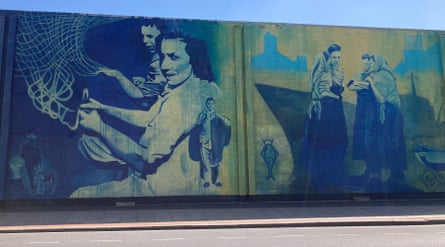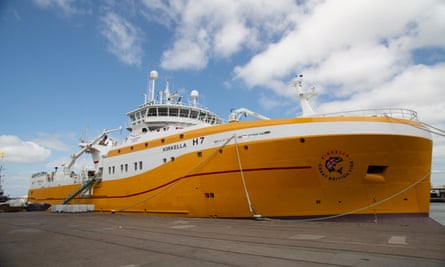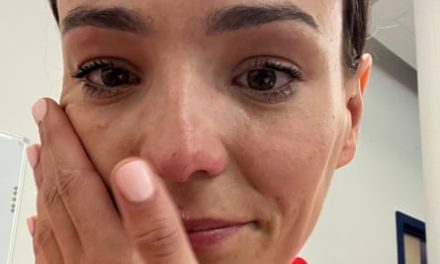Docked in the port of Hull, the fishing vessel Kirkella dominates the quayside, towering over a nearby warehouse. Usually found trawling Arctic waters off the coast of Svalbard, catching cod and haddock to supply British fish and chip shops, it is in port for a short time before departing on another lengthy voyage to those distant seas.
It’s not just enormous: the five-year-old freezer trawler is also state-of-the-art. Fish snared in its giant nets are filleted and frozen within 40 minutes inside the onboard “factory” that spans a deck of the ship.
The Kirkella also contains enough modern comforts to sustain and entertain a 32-strong crew during weeks at sea, from a medical room and gym to a sauna and cinema.
Just hours after docking, the latest catch – about 300 tonnes of frozen fish fillets – has already been transported in Kirkella-branded boxes to the fish market at Grimsby, to be weighed, graded and sold.
While this may sound like a vast amount of fish, the UK’s only remaining “distance trawler” has returned home only half-full from its latest expedition.
“The catch wasn’t so good this time,” says the first mate, Dean Jackson, 53, who is finishing up checks of the vessel on the bridge before enjoying some time at home with his family after about six weeks at sea.
“Fishing is erratic,” he says. “We had four days when it was really good. But the problem when you get really good fishing is you’re at the mercy of the factory and processing.”
The reduced catch will also mean a financial hit for the crew, including deckhands Kurt Derees, Mark Gibson and Kane Thornley, who are clearing huge bags of fishmeal out of one of the chilly storage rooms before their shore leave begins. As share fishers, they are self-employed and are all paid a share of the haul, with a greater percentage being awarded to those in positions of responsibility, such as the captain and first mate.
“We could have stayed out longer,” says Jane Sandell, chief executive of UK Fisheries, the Kirkella’s owner. “But the guys need some kind of quality of life. Six to eight weeks at sea is plenty not seeing your family.”

The Kirkella now finds itself something of a symbol of a vanishing age, and a last vestige of the UK’s external northern waters fleet, which operated from Hull, Grimsby, Fleetwood and Aberdeen. In the late 1950s, there were more deep-sea distance trawlers in Hull than anywhere in the world, with nearly 170 vessels operating from the city, directly employing about 5,000 trawlermen, according to Stand, the Hull fishing heritage charity.
UK Fisheries sold its only other UK vessel, the trawler Farnella, at the end of 2022. The company says it became unviable after the slashing of the whitefish quota awarded to the UK in last year’s negotiations with Norway. Since Brexit, the UK now conducts these annual talks independently, rather than as part of the EU.
Sporting a fish-patterned tie, Boris Johnson promised a “prodigious” increase in quotas when he outlined the terms of the UK’s exit from the EU on Christmas Eve 2020. But independence has not brought the hoped-for rewards.
“We are at 50% of the quota that we had prior to Brexit, and we are taking longer to catch it,” Sandell says. As a result of the loss of quota and changes in access to Norwegian waters, the Kirkella will only make about six trips this year, and will spend more time in port. It will also have to sail to more distant waters, resulting in higher operating costs.
Under the current agreement, the Kirkella’s quota requires it to fish only in Norway’s remote Svalbard zone, which has separate arrangements from other Norwegian waters.
“Now we have a negligible amount of quota in the Norwegian zone, so all of our fish is in Svalbard,” says Sandell. “Previously, we would have gone to fish in Norwegian waters when the catch was better there, but now we are forced further north, which isn’t ideal, because you’ve got more ice and the weather is worse.”
The Department for Environment, Food and Rural Affairs (Defra) hailed the success of “increased fishing opportunities” worth nearly £5m for the UK in 2023, including a near-£3m quota of North Sea whitefish, after reaching agreement with Norway last November. At the time, Defra said the deal would “secure access to key fishing stocks for UK vessels” and said this meant that both British and Norwegian boats could fish in the North Sea.
However, Sandell and the crew of the Kirkella tell a different story. While some vessels in the UK have undoubtedly benefited from the negotiations, UK Fisheries – which catches cod, haddock and other demersal fish found near the bottom of the ocean – has seen its quota cut in half since the UK left the EU.

Before Brexit, the Kirkella alone caught about 10% of the cod and haddock destined for Britain’s chip shops. The loss of quota has seen this fall to 5%, Sandell says, adding that the shortfall has been covered by imports of fish caught in the same Arctic waters, but by Norwegian, Icelandic and Russian boats – and this despite the introduction last year of a 35% tariff on imports of Russian whitefish.
“Norway has got free access to our markets, yet we can’t fish in Norwegian waters. It should be a quid pro quo,” she says.
Her frustration is evident as she lays the blame at the door of the British government. “We have been gifted our own freedom, our own future here, and it is has been a failure of priorities and negotiation,” she says. “It seems that our first couple of years as an independent coastal state haven’t been that much of a success. The [fishing] rights that we have brought over generations have basically been squandered.”
UK Fisheries says its complaints are backed up by figures calculated by a former Defra fisheries negotiator.
They found that “preferential treatment” had been given to vessels belonging to the small, mostly Scottish-based fleet that catches pelagic fish – those that live far away from land but not close to the seabed – including mackerel and herring, which are not eaten as much in Britain and are mostly exported.
The former negotiator’s analysis of publicly available data found that the UK’s large pelagic vessels had gained 1,000 times more than other ships from agreements struck by ministers since Brexit, while others, such as the Kirkella, have lost out. They reported that the tonnage of fish landed by the UK fleet since 2019 has increased by almost 30,000 tonnes, but its value has decreased by almost £66m.
Labour’s Daniel Zeichner, a shadow environment minister who has previously visited Kirkella in port, says he is “troubled by what has happened to UK Fisheries and Kirkella within the post-Brexit setup”.
As a member of the opposition, he did not have full access to the UK’s Norway negotiations, but he says he has “the sense that if the Scottish pelagic fleet are fairly happy and UK Fisheries are not, it is hard to resolve that commercial conundrum.”
It is understood the government believes it has sought more “balanced” bilateral deals with Norway since Brexit. But staff at UK Fisheries wonder whether they are a low priority because, despite the name, the business is foreign-owned; Dutch and Icelandic companies bought the struggling operations of British firm J Marr in 2006.
“It is a question that we are asking on a frequent basis, and we are no nearer to understanding,” Sandell says, adding that the company contributes to the UK economy through employing a 75% British crew, landing into a UK port, using UK hauliers and cold stores, and selling almost of what it catches to the UK.
For now, UK Fisheries’ owners are committed to the vessel and to Britain, but Sandell warns they are waiting for the UK government to “see sense and negotiate better deals – not just for us but for British fishing, because it’s not just us that has been let down, but a lot of people.”

Defra said: “The Norway deal for 2023 benefits UK industry by securing the quota and reciprocal access of most importance to UK vessels.”
Among the Kirkella’s majority Brexit-voting crew, the feeling is one of betrayal. First mate Jackson’s sons have followed him into the company, where one works onboard as a chef and another as a deckhand. His own father worked there too.
“I voted Brexit, all of us did,” he says. “Because of what we were led to believe, not just for the fishing industry, but on other things as well. For any young guy just starting, like my two lads, it’s a worry. And that’s all down to Brexit and losing our quota.”
The decline in Hull’s fishing industry predates Brexit by several decades, back to the “cod wars” between Britain and Iceland, starting in the late 1950s, over access to fishing grounds in the north Atlantic. Nowadays, fishing represents less than 1% of the UK’s economic output, but it is still part of the lifeblood of small coastal communities, from Cornwall to northern Scotland.
On Hull’s Hessle Road, once the heart of the fishing community, murals of women repairing nets and nursing babies serve as a reminder of a bygone age, when those on shore eagerly awaited the return of the fleet.
As the UK continues talks with Greenland over potential access to its waters, many of the 24,000 employed in domestic fishing and processing in Hull and beyond are watching nervously – waiting for news of the next haul of quotas and concerned about what any further mis-steps could do to their livelihoods.
Join the exciting world of cryptocurrency trading with ByBit! As a new trader, you can benefit from a $10 bonus and up to $1,000 in rewards when you register using our referral link. With ByBit’s user-friendly platform and advanced trading tools, you can take advantage of cryptocurrency volatility and potentially make significant profits. Don’t miss this opportunity – sign up now and start trading!







Recent Comments